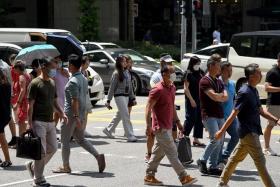Efforts to help workers ‘cannot lose pace’
Unions must continue to support them as new challenges are brought on by technological disruption: Ng Chee Meng
Fifty years after the labour movement changed course and took on a more collaborative approach to working with the Government and employers, its efforts to improve workers' lot cannot lose pace, said labour chief Ng Chee Meng.
Just as the 4G Government will partner Singaporeans to improve policies and programmes, the labour movement will also engage workers to identify and crowdsource for the best solutions amid rapid changes in society and the world, said Mr Ng yesterday.
"This will steer us well forward for the next 50 years and beyond."
He was speaking at the opening of the ReUnion exhibition at the National Museum of Singapore, which commemorates the 50th anniversary of NTUC's Modernisation Seminar that set the stage for tripartite efforts between the unions, employers and Government.
When unions took that approach, the situation was dire and it was "modernise or die", said Mr Ng, who is secretary-general of the National Trades Union Congress.
Now new challenges loom, brought on by technological disruption, he said. Some workers will be displaced, but many will benefit - if they can adapt.
The labour movement is setting up company training committees to help reskill at least 330,000 workers to seize the new opportunities, said Mr Ng.
Striking a similar note, President Halimah Yacob, who opened the exhibition, said the seminar 50 years back was momentous for unionists.
"It required them to rethink their role, redefine what workers' protection means in a more holistic manner beyond just collective bargaining and to take a stake in the future of Singapore," she said.
While the context today is different, the challenges are equally daunting, she said.
The tripartite partners need to work even more closely together now, as global uncertainties weigh on Singapore's economic performance, and rapid technological advancements and the ageing population reshape jobs.
Initiatives like the industry transformation maps and Adapt and Grow programmes - which help Singaporeans affected by restructuring - are helping to prepare for those challenges, she noted.
Madam Halimah, who spent 33 years in the NTUC, said that the way the labour movement here operates is "unique and special".
Pushing for productivity improvements, for example, is not always well received among unions in other countries due to fears of job losses.
She said that in Singapore, the tripartite relationship helped, for instance, in the 2008 financial crisis when thousands of workers faced retrenchment.
The Skills Programme for Upgrading and Resilience was quickly introduced, and employers worked with unions to send their excess manpower for training subsidised by the Government, instead of retrenching them.
Madam Halimah added: "There's a real need for our younger generation especially to understand where we started, how we started, why did we take those steps, why it was important to us then, and why it continues to be equally important today."
FOR MORE, READ THE STRAITS TIMES TODAY
Get The New Paper on your phone with the free TNP app. Download from the Apple App Store or Google Play Store now


